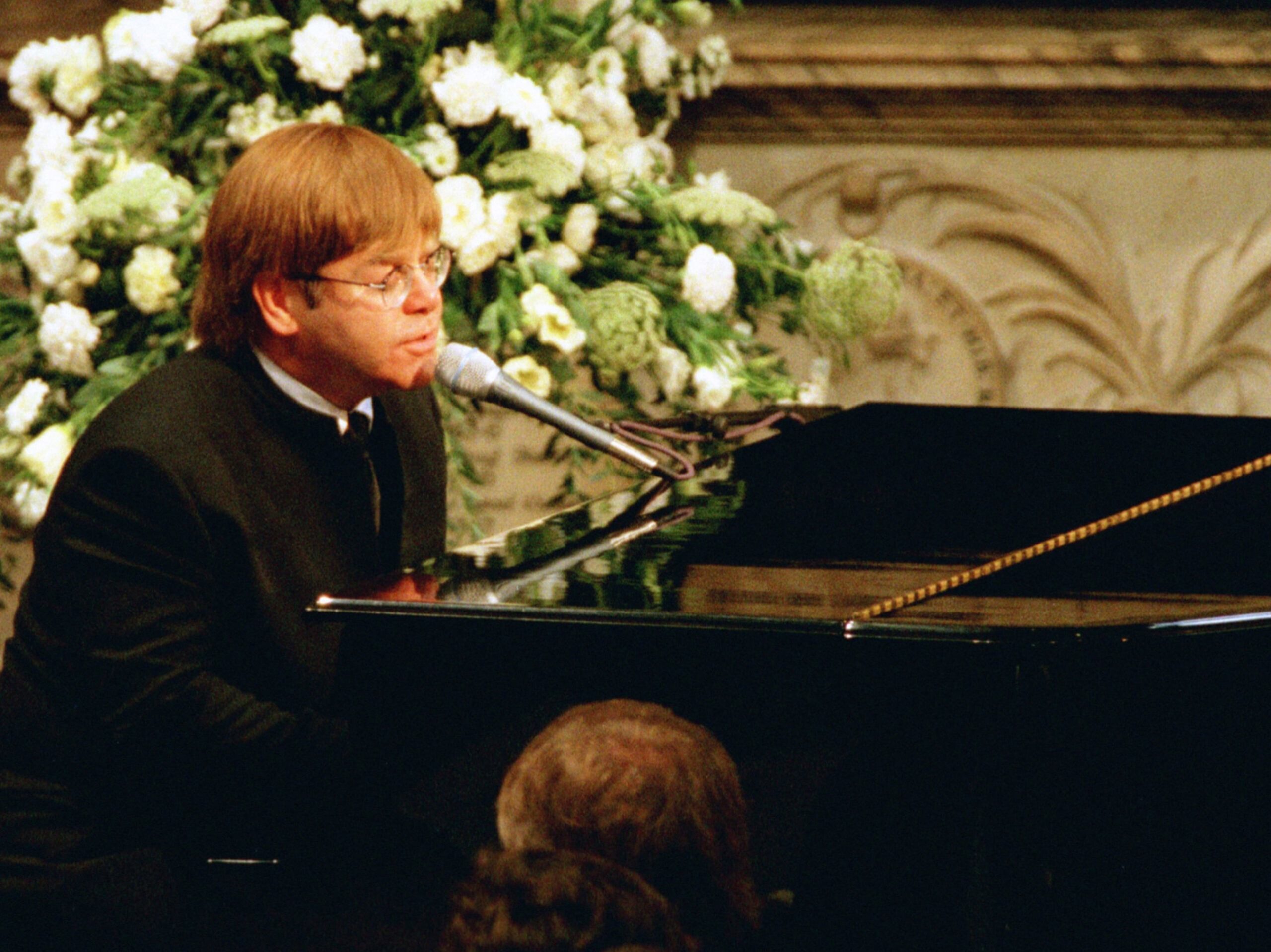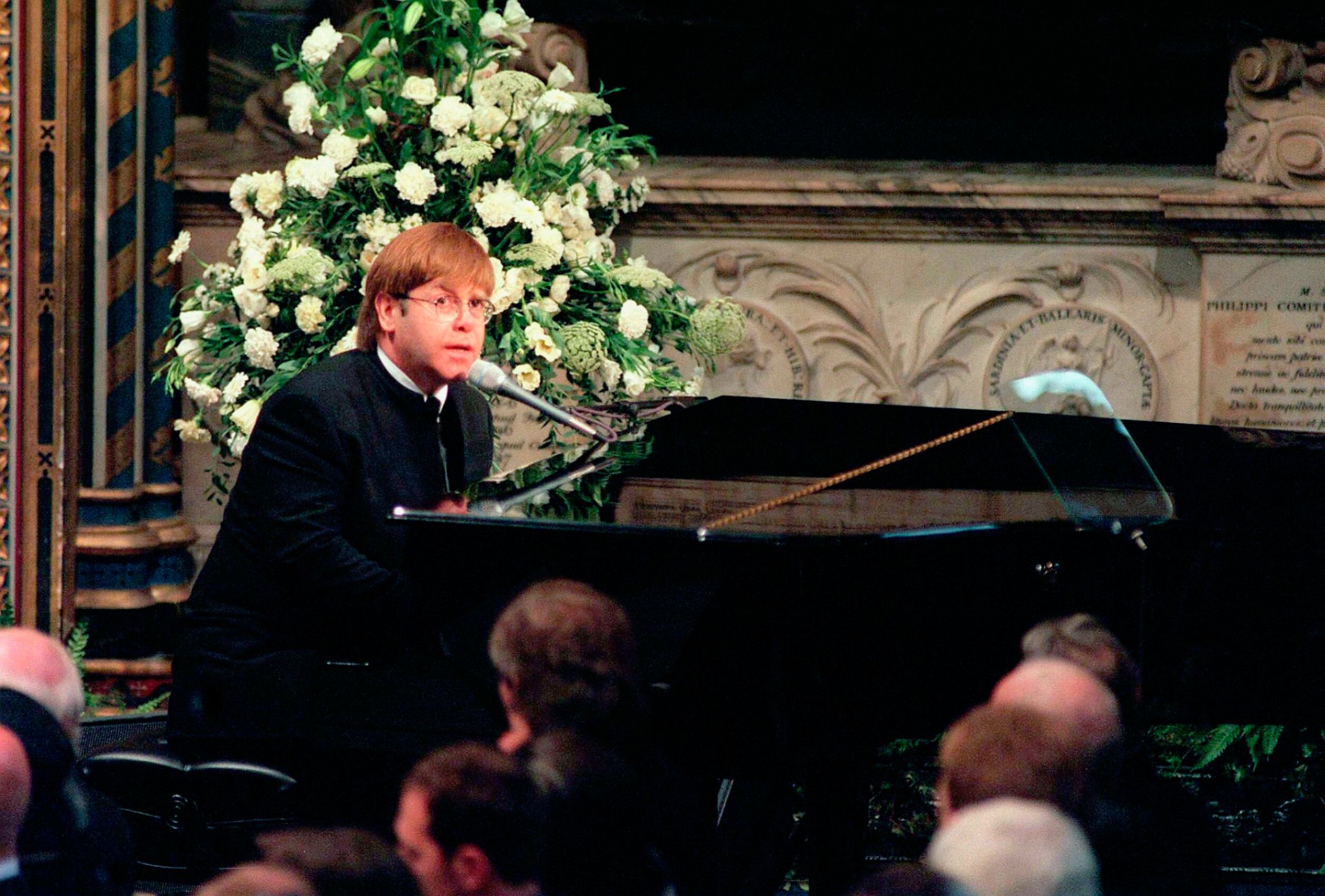The Day the World Stopped: How Elton John’s Tearful Tribute to Princess Diana with “Candle in the Wind 1997” Became the Most Heartbreaking, Unforgettable Goodbye Ever Performed Live
The morning of September 6, 1997, was unlike any other. London was blanketed in a heavy silence, the kind that doesn’t come from the absence of sound — but from the weight of millions of broken hearts. Streets overflowed with flowers, letters, and trembling hands holding pictures of Princess Diana, the woman the world had come to call the People’s Princess.
Inside Westminster Abbey, the air was suffocating with grief. It wasn’t just a royal funeral. It was a farewell from an entire planet. Among the sea of dignitaries, celebrities, and mourning eyes, one man sat quietly, almost folding into himself — Elton John. His hands trembled, not out of nerves, but from the sheer impossibility of what he was about to do.

Elton and Diana had been unlikely, but inseparable friends. Beneath the glitter of fame, they had found comfort in each other’s vulnerabilities. Both knew what it meant to be judged, misunderstood, chased by tabloids, and to wear a smile when it hurt to breathe. They shared laughter over silly things, consoled one another in darker moments, and often escaped the suffocating expectations of their worlds together.
When the news broke — the crash, the tunnel in Paris, the impossible confirmation — Elton was shattered. At first, he refused to believe it. Then came the guilt: Why hadn’t I called her back sooner? Why did we always think there would be more time?
Just days before the funeral, as the world scrambled to process the loss, Elton’s close friend and lyricist Bernie Taupin made a quiet suggestion. “Why don’t we rewrite ‘Candle in the Wind’? For her.”
Elton hesitated. That song was originally for Marilyn Monroe, another woman swallowed by fame. But the more he thought about it, the more it made sense. Diana too had been a bright, fragile flame — admired, adored, and often exploited. A life both magnificent and cruelly short.
That night, Bernie sat down, pen trembling in hand. “Goodbye England’s Rose…” the words poured out like a eulogy from the soul of an entire nation.

The morning of the funeral, Elton was told he had the option to pull out. “No one would blame you,” whispered one of the Abbey’s officials. “If you can’t do it, it’s okay.”
But he knew he had to.
As he walked toward the grand piano stationed near the altar, the world seemed to hold its breath. Cameras were rolling. Billions were watching. But for Elton, there was only one person in the audience — Diana.
He sat down, adjusted the microphone, and placed his hands on the keys. For a moment, he froze — overwhelmed by the finality of it all. Then, as if guided by something beyond himself, the melody began.

“Goodbye England’s rose
May you ever grow in our hearts…”
The voice that echoed through the Abbey wasn’t the flamboyant Elton John the world knew. It was a stripped, fragile, raw version of him — a man singing not as a performer, but as a grieving friend. Every line trembled with unshed tears, every note felt like a prayer desperately trying to hold her memory together.
The camera panned to the royal family, and for a rare moment, even the most stoic faces cracked. Princes William and Harry sat small, drowning in suits too big for boys their age, eyes swollen, hands clenched. Queen Elizabeth, usually the embodiment of composure, lowered her gaze — not in protocol, but in grief.
As the final chord echoed, the Abbey fell into a silence so thick it felt holy.
What the world didn’t know was this: it almost never happened.
Hours before the funeral, there was an internal debate within the palace. Some advisors felt it was “inappropriate” to have a pop song at a royal funeral — too modern, too informal. But the public outcry, the ocean of flowers outside Kensington Palace, the millions standing shoulder-to-shoulder in Hyde Park watching giant screens — all of it sent a message louder than any tradition could silence.
The people needed this song. They needed someone to put into words what their throats couldn’t form.

After the funeral, the newly rewritten “Candle in the Wind 1997” was released as a charity single. It didn’t just break records — it shattered them. The single became the best-selling physical single of all time, with over 33 million copies sold worldwide. All proceeds went to charities Diana had supported, continuing her legacy long after her voice had been silenced.
But Elton, true to his word, never performed the song again. Not live. Not even for a private audience. He said it belonged to Diana now. It was never meant to be part of a setlist. It was a goodbye — a forever goodbye.
In the years since, people still talk about that day. About how, for a moment, a song stitched the world together in shared heartbreak. About how music became more than entertainment — it became a vessel for collective mourning, for memory, and for healing.
For Elton, that performance wasn’t just a tribute to Diana. It was a reminder of something deeper: that no matter how bright someone burns, the love they leave behind can never be extinguished.
And somewhere, maybe, if we let ourselves believe, a rose still grows — wild, defiant, and free — far beyond the confines of palaces, paparazzi, and broken promises.
Goodbye, England’s rose. You bloomed for all of us.
